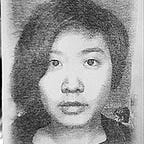ZHUANG B — (v.) to be a poser
In Chinese internet parlance, to 装B (zhuāng bì) is to put on airs — worldly, moneyed, educated, eccentric, or any other combination thereof. In other words: to be a fucking poser.
装B is a shorthand for 装牛屄 (zhuāng níu bì): zhuang means “pretend”, niu bi literally means “cow’s cunt” but has come to figuratively mean “badass”. The character for cunt, 屄, is hard to find when typing, so it’s often replaced with the more common character 逼 or simply the English letter “B”.
装B is taking 58 selfies in front of the Eiffel Tower and posting the best two with a French caption you copied from a movie. 装B is posting deep lyrics on your Weibo account late at night. 装B is casually dropping English into the conversation, especially if you don’t speak it but also if you speak it fluently. 装B is buying knockoff Issey Miyake bags on Taobao. 装B is being an impostor, or maybe just having impostor syndrome. 装B encompasses faking it until you make it, pretending to be into a band to get closer to your crush, and DJ Khaled washing his hands in a gold sink all at once.
To paraphrase RuPaul: We’re born naked, and the rest is 装B.
In China, 装B is mostly used as a light, often self-deprecating insult. But I see its prevalence as a good omen. Just as shadow implies the existence of light, the surest sign of healthy subcultural growth is people calling other people posers. More broadly, I think the generational obsession with 装B-ing is a necessary by-product of all the new possibilities available to young, middle-class Chinese people in the 2010s: economic and geographic mobility, loosened borders for travel and cultural exchange, the novel luxury of considering your identity and aesthetics. In a world changing at an unfathomable pace, 装B-ing is a way for Chinese millennials to practice defining their whole way of life.
But I chose 装B as a theme for the first Multi Entry zine for personal reasons, too. After all, nothing makes you an expert at 装B-ing faster than immersive fieldwork, especially in a place that you sometimes call home and with people who might be your friends. I spent 9 weeks in China posing — sometimes as more American than I was, sometimes as more Chinese than I was, sometimes just as myself.
Occasionally, I passed.
This essay is the introduction to a dead-tree zine I made as part of the Multi Entry project. If you want to read the other 30 pages, you can get a copy here.
